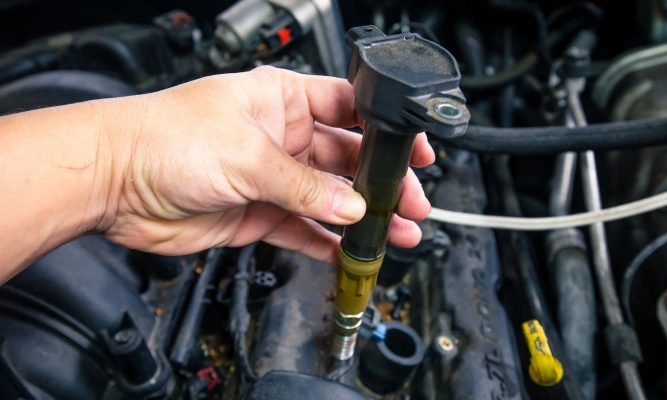OUTLINE:
Understanding What Does An Ignition Coil Do
 260
260Have you ever pondered the distinctive mechanism that ignites your car's engine into action? What sets apart the humble ignition coil in the symphony of automotive components?

Image Source:Amazon.com
In "Decoding the Function and Importance of Ignition Coils in Automotive Engines," we delve deep into the distinctive role these coils play, unraveling their significance in powering your vehicle.
What Is An Ignition Coil[Quick Answer]
An ignition coil is a component in the ignition system of a vehicle that transforms the low-voltage power from the battery into the high-voltage spark needed to ignite the fuel-air mixture in the engine's combustion chamber.
It consists of primary and secondary coils wrapped around an iron core, with the primary coil being energized by the vehicle's electrical system and the secondary coil generating the high-voltage spark.
This spark is then sent to the spark plugs, initiating combustion and powering the engine.
What Does An Ignition Coil Do[Detailed Information]
An ignition coil is a crucial component of the ignition system in gasoline-powered vehicles. Its primary function is to transform the low-voltage electrical energy from the vehicle's battery into the high-voltage energy needed to ignite the fuel-air mixture in the engine's combustion chamber.

Image Source:Endurance.com
Here's a breakdown of its operation:
-
Voltage Transformation:
-
The ignition coil operates on the principle of electromagnetic induction. It consists of two coils of wire—the primary coil and the secondary coil—wrapped around an iron core.
-
When the ignition switch is turned on, current flows from the vehicle's battery through the primary coil, creating a magnetic field around the iron core.
-
-
Energy Storage:
-
As the current flows through the primary coil, it generates a magnetic field. When the current is interrupted (typically by the ignition control module or ignition points), the magnetic field collapses rapidly.
-
This rapid collapse induces a much higher voltage in the secondary coil through electromagnetic induction.
-
-
Voltage Amplification:
-
The secondary coil, having many more windings than the primary coil, amplifies the voltage to a much higher level—typically tens of thousands of volts.
-
This high-voltage output is necessary to produce a spark with enough energy to jump across the spark plug gap and ignite the compressed fuel-air mixture in the engine's cylinders.
-
-
Spark Generation:
-
The high-voltage output from the ignition coil is directed to the distributor or directly to the spark plugs, depending on the vehicle's ignition system design.
-
At the spark plug, the high-voltage electrical charge jumps the spark plug gap, creating a spark that ignites the air-fuel mixture.
-
-
Timing and Firing Sequence:
-
The ignition coil is synchronized with the engine's firing sequence to ensure that each cylinder receives the spark at the correct time during its compression stroke.
-
Modern vehicles use electronic ignition systems, which precisely control the timing and duration of the spark for optimal engine performance and efficiency.
-
What Does A Bad Ignition Coil Do to A Car
When an ignition coil goes bad, it can have several negative effects on a car's performance and operation.
Here are some common issues associated with a faulty ignition coil:
-
Engine Misfires:
-
A bad ignition coil can cause intermittent or consistent engine misfires, where the fuel-air mixture in one or more cylinders fails to ignite properly.
-
This can result in rough idling, hesitation, or a noticeable loss of power during acceleration.
-
Poor Fuel Economy:
-
Engine misfires caused by a faulty ignition coil can lead to inefficient combustion, resulting in decreased fuel economy.
-
The engine may require more fuel to compensate for the lack of power, leading to increased fuel consumption.
-
Difficulty Starting the Engine:
-
A failing ignition coil may cause difficulty starting the engine, especially when the vehicle is cold.
-
This is because the weakened spark produced by the faulty coil may not provide enough ignition energy to start the engine reliably.
-
Stalling
-
In severe cases, a bad ignition coil can cause the engine to stall unexpectedly, particularly during acceleration or when idling at low speeds.
-
This occurs when the engine misfires become so severe that the engine cannot maintain proper combustion.
-
Increased Emissions:
-
Engine misfires caused by a faulty ignition coil can result in increased emissions of unburned hydrocarbons (HC) and other pollutants.
-
This can lead to a failed emissions test and contribute to environmental pollution.
-
Check Engine Light (CEL) Illumination:
-
A malfunctioning ignition coil can trigger the vehicle's onboard diagnostic system to illuminate the check engine light (CEL).
-
The system may store diagnostic trouble codes (DTCs) related to misfires or ignition system faults, helping technicians identify the underlying issue.
-
Damage to Catalytic Converter:
-
Prolonged engine misfires caused by a faulty ignition coil can lead to overheating of the catalytic converter.
-
This can cause damage to the converter over time, leading to costly repairs.
How Do I Know if my Ignition Coil Is Good or Bad
Here's a concise step-by-step guide:
-
Check for Symptoms: Look for engine misfires, difficulty starting, rough idling, or a check engine light.
-
Inspect the Ignition Coil: Look for physical damage like cracks or corrosion.
-
Perform Resistance Test: Use a multimeter to measure resistance of primary and secondary coils. Compare values to specifications.
-
Perform Spark Test: Remove spark plug wire, insert spare plug, and observe for a strong, blue spark when cranking the engine.
-
Consider Professional Diagnosis: If unsure or lacking tools, seek assistance from a mechanic.
Final Verdict
Understanding the function and importance of ignition coils in automotive engines is crucial for maintaining optimal vehicle performance.
Ignition coils play a vital role in transforming low-voltage electrical energy into high-voltage sparks, which ignite the air-fuel mixture in the combustion chamber.
By decoding their operation, drivers and technicians can diagnose issues, such as engine misfires or starting difficulties, and take appropriate actions to ensure smooth engine operation.
With proper maintenance and timely replacements when necessary, ignition coils contribute to reliable engine performance and efficient vehicle operation, ultimately enhancing the driving experience and prolonging the life of the vehicle.

Disclaimer: The views and opinions expressed by individual authors or forum participants on this website do not represent the views and opinions of Chipsmall, nor do they represent Chipsmall's official policy.

share this blog to:

